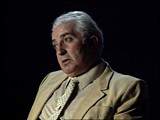<< Previous | Displaying results 2351-2360 of 6707 for "" | Next >>
-
Gerda Haas describes postwar reunion with her father in the United States
Oral HistoryGerda was raised in a religious family in the small town of Ansbach, Germany, where her father was the Jewish butcher. She attended German schools until 1936, and then moved to Berlin to attend a Jewish school. She returned to her hometown after Kristallnacht in November 1938. Her family was then ordered to move to Munich, and in July 1939 her father left for England and then the United States. He was unable to arrange for the rest of his family to join him. Gerda moved to Berlin in 1939 to study nursing.…
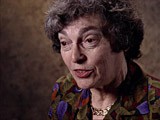
-
Madeline Deutsch describes her postwar experiences
Oral HistoryMadeline was born into a middle class family in an area of Czechoslovakia that was annexed by Hungary in 1938-1939. Her father worked out of their home and her mother was a homemaker. Madeline attended high school. In April 1944 her family was forced into a Hungarian ghetto. The family lived in the ghetto for two weeks before being transported to Auschwitz. Madeline and her mother were separated from her father and older brother. Neither her father nor brother survived the war. A week after arriving in…
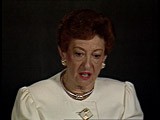
-
Rifka Muscovitz Glatz describes living on a kibbutz and dealing with language barriers
Oral HistoryRifka was raised in a religious family in Debrecen. In the early 1940s, her family moved to Cluj (Kolozsvar) in Northern Transylvania, annexed to Hungary from Romania in 1940. In 1944, she and her family were forced to leave their house in Cluj. They were rounded up by Hungarian troops helping the Nazis and taken to a brick factory where they stayed for a month. In June 1944, Rifka was transported to the Bergen-Belsen concentration camp. Eight months later she was transported to Switzerland. She sailed to…

-
Sam Spiegel describes conditions on board a ship to the United States
Oral HistoryIn 1942, Sam was forced into a ghetto in his hometown and assigned to work in a munitions factory. In 1944 he was transported to Auschwitz and then forced to work in a train factory. He survived eight days on a death march after the evacuation of Auschwitz by the Nazis. He was liberated by Soviet units in January 1945. He lived in a displaced persons camp in Germany where worked for the United Nations Relief and Rehabilitation Administration. In 1947, he immigrated to the United States.
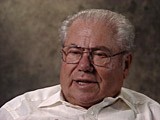
-
Sam Spiegel reflects on survival during the Holocaust
Oral HistoryIn 1942, Sam was forced into a ghetto in his hometown and assigned to work in a munitions factory. In 1944 he was transported to Auschwitz and then forced to work in a train factory. He survived eight days on a death march after the evacuation of Auschwitz by the Nazis. He was liberated by Soviet units in January 1945. He lived in a displaced persons camp in Germany where worked for the United Nations Relief and Rehabilitation Administration. In 1947, he immigrated to the United States.
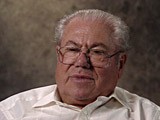
-
Frima L. describes roundup of Jews for mobile killing unit (Einsatzgruppen) massacre
Oral HistoryWhile Frima's family was confined to a ghetto, Nazis used her father as an interpreter. He later perished. By pretending not to be Jews, Frima, her mother, and sister escaped a German mobile killing unit massacre. They were later discovered and jailed. Again, her mother devised an escape. Frima's mother and sister were smuggled to Romania, while Frima wandered in search of safekeeping until her mother could arrange to smuggle her out. In Romania, they were reunited and liberated.
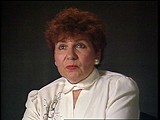
-
Bart Stern describes how he survived to be liberated in the Auschwitz camp
Oral HistoryFollowing the German occupation of Hungary in March 1944, Bart was forced into a ghetto established in his home town. From May to July 1944, the Germans deported Jews from Hungary to the Auschwitz killing center in occupied Poland. Bart was deported by cattle car to Auschwitz. At Auschwitz, he was selected to perform forced labor, drilling and digging in a coal mine. As Soviet forces advanced toward the Auschwitz camp in January 1945, the Germans forced most of the prisoners on a death march out of the…
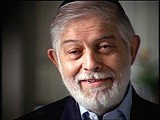
-
Gerda Weissmann Klein describes her liberation by a US soldier after a death march in Czechoslovakia
Oral HistoryIn 1939, Gerda's brother was deported for forced labor. In June 1942, Gerda's family was deported from the Bielsko ghetto. While her parents were transported to Auschwitz, Gerda was sent to the Gross-Rosen camp system, where for the remainder of the war she performed forced labor in textile factories. Gerda was liberated after a death march, wearing the ski boots her father insisted would help her to survive. She married her American liberator.
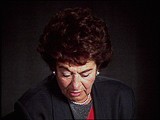
-
Kurt Klein describes a group of death march survivors in a Czechoslovak village
Oral HistoryAs Nazi anti-Jewish policy intensified, Kurt's family decided to leave Germany. Kurt left for the United States in 1937, but his parents were unable to leave before the outbreak of World War II. Kurt's parents were eventually deported to Auschwitz, in German-occupied Poland. In 1942, Kurt joined the United States Army and was trained in military intelligence. In Europe, he interrogated prisoners of war. In May 1945, he took part in the surrender of a village in Czechoslovakia and returned the next day to…

-
Sam Itzkowitz describes the first moments of liberation
Oral HistoryThe Germans invaded Poland in September 1939. When Makow was occupied, Sam fled to Soviet territory. He returned to Makow for provisions, but was forced to remain in the ghetto. In 1942, he was deported to Auschwitz. As the Soviet army advanced in 1944, Sam and other prisoners were sent to camps in Germany. The inmates were put on a death march early in 1945. American forces liberated Sam after he escaped during a bombing raid.
